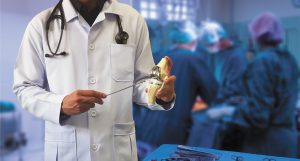Key Steps to Recovery After Knee Replacement Surgery
By Sergio Martinez, DO, AOA, AOAO
 Undergoing knee replacement surgery is a significant step towards improving mobility and reducing pain for individuals suffering from severe knee conditions. However, the success of the surgery relies heavily on the postoperative recovery process. In this article, we will explore five essential aspects of recovery after knee replacement surgery: the importance of pain control, immediate ambulation, physical therapy, the use of a walker for safety and stability, and ultimately, the return to a full, active lifestyle.
Undergoing knee replacement surgery is a significant step towards improving mobility and reducing pain for individuals suffering from severe knee conditions. However, the success of the surgery relies heavily on the postoperative recovery process. In this article, we will explore five essential aspects of recovery after knee replacement surgery: the importance of pain control, immediate ambulation, physical therapy, the use of a walker for safety and stability, and ultimately, the return to a full, active lifestyle.
1. The Importance of Pain Control
Pain management is crucial after knee replacement surgery. Effective pain control not only ensures patient comfort but also promotes a faster recovery. Patients are typically prescribed pain medications to alleviate postoperative pain. It is essential to adhere to the prescribed dosage and timing while being mindful of potential side effects. Open communication with healthcare professionals about pain levels and medication effectiveness is crucial to optimize pain control during the recovery period.
2. The Importance of Immediate Ambulation after Surgery
Early ambulation, or getting up and walking as soon as possible after surgery, is a vital component of the recovery process. While it may seem challenging at first, immediate ambulation offers numerous benefits. It helps prevent blood clots, improves circulation, reduces swelling, and enhances joint flexibility. Healthcare professionals will guide patients through specific exercises and provide assistive devices like crutches or walkers to ensure safe ambulation during the initial stages of recovery.
3. The Importance of Physical Therapy
Physical therapy plays a significant role in the rehabilitation process following knee replacement surgery. It focuses on restoring strength, range of motion, and overall function of the knee joint. Physical therapists design personalized exercise programs tailored to each patient’s specific needs and goals. These programs typically include a combination of stretching, strengthening, and balance exercises. Attending regular physical therapy sessions and diligently following the recommended home exercises are vital for optimal recovery outcomes.
4. The Use of a Walker for Safety and Stability
During the early stages of recovery, many patients rely on a walker for added safety and stability. Using a walker helps reduce the risk of falls, supports weight-bearing, and provides a sense of security. Healthcare professionals will assist patients in selecting and adjusting the appropriate walker. Proper usage and technique are taught to ensure patients are comfortable and confident while mobilizing with the aid of a walker.
5. Return to a Full Active Lifestyle after Knee Replacement
The ultimate goal of knee replacement surgery is to enable individuals to regain an active and fulfilling life. As the recovery progresses, patients gradually regain strength, flexibility, and mobility. Engaging in regular physical therapy exercises, following the recommended postoperative guidelines, and maintaining a positive mindset are crucial for a successful recovery. With time and patience, many individuals are able to return to activities they once enjoyed, such as walking, swimming, cycling, and even low-impact sports, allowing them to lead a full, active lifestyle once again.
Recovering after knee replacement surgery requires dedication, commitment, and patience. By prioritizing pain control, embracing early ambulation, engaging in physical therapy, utilizing a walker for safety, and maintaining a positive outlook, individuals can maximize their chances of achieving a successful recovery. Remember to consult with healthcare professionals for personalized advice and guidance throughout the recovery journey. With determination and the right approach, individuals can regain their mobility, reduce pain, and reclaim an active lifestyle after knee replacement surgery.
SERGIO MARTINEZ, DO, AOA, AOAO
Sergio Martinez, D.O. is a board certified orthopedic surgeon. Dr. Martinez earned his bachelor’s degree in Psychology with a minor in Chemistry from the University of Miami, Coral Gables. He received a certificate in Biomedical Sciences from the Philadelphia College of Osteopathic Medicine and then received his Doctorate of Osteopathy from the same.
(407) 355-3120
www.optimotion.com
 Central Florida Health and Wellness Magazine Health and Wellness Articles of the Villages
Central Florida Health and Wellness Magazine Health and Wellness Articles of the Villages



